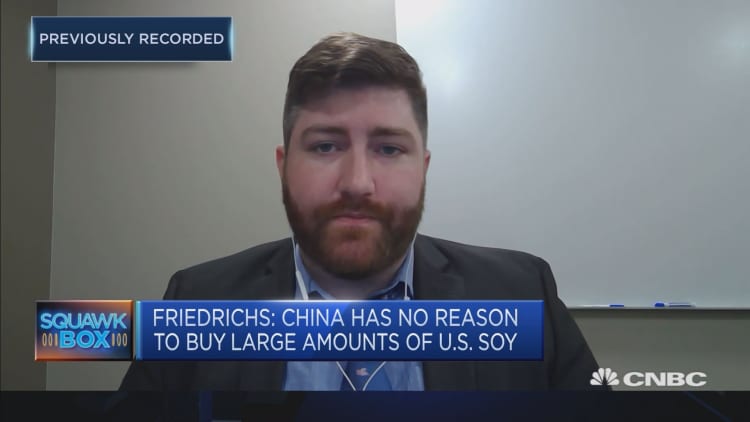
Daniel Richard stands in a 250-acre field, surveying the ruins of his hard work: Rotting soybeans as far as the eye can see.
"We're in unchartered waters," says the fourth-generation Louisiana grain farmer. "We've been through tough times, but definitely nothing of this magnitude."
This is just one field Richard had to leave unharvested. In total, about 800 acres, 40 percent of his crop, sit dried out and useless.
"We lost the demand in the market with the tariffs. There were no exports. They weren't shipping out. China wasn't buying, of course China buys about, a little over 50 percent of our crop."
Richard's family has been farming this land for 110 years. His son is the fifth generation working the farm. They have about 3,000 acres from Arnaudville to Port Barre. About 80 percent is soybeans. The rest is rice.
"A normal year, you know we're probably a million- to a million-and-a-half-dollar operation, and we always harvest all of our crop every year, which didn't happen this past year," Richard says.
The rotted beans are worth about $400,000. An equal amount of good, harvested crop is sitting in his full grain bins, with no one to buy them.
But it's not just farmers feeling the pain. Tariffs have hit the trade-sensitive state of Louisiana particularly hard overall.
Businesses here paid $19 million in tariffs in October alone, more than eight times the duties paid on the same products one year earlier, according to Tariffs Hurt the Heartland, a bipartisan anti-tariff lobbying group, and economic consulting firm The Trade Partnership.
"The effects to this point in Louisiana are perhaps a bit more acute and recognizable, given the size of the state's economy and the types of industries we're talking about being impacted here," says Stephen Barnes, director of the LSU Economics & Policy Research Group.
Louisiana's ports are a major concern in the tariff war.
"Louisiana because of our position at the mouth of the Mississippi River handles an enormous portion of agricultural exports nationally," says Barnes. "So when we think about effects to farmers in Iowa and Missouri, a piece of that's going to hit Louisiana as well, because we're no longer handling that cargo."
In fact, breakbulk exports at the Port of New Orleans were down 14 percent in 2018 compared to 2017, mostly due to the decline in agricultural cargo. The port handles 60 percent of export grain from the Midwest. Imports were even harder hit, down 26 percent, much of that decline driven by steel.
Barnes says that while some steel mills in Louisiana are benefitting because U.S.-made steel is more competitive now, the negative tariff hit is much broader than any potential upside.

Daniel Richard worries that for him, the negative hit could become permanent, and his son's legacy could be lost.
When asked what he will do if the tariff situation isn't settled in time for planting in April, Richard says, "This year we grew a crop all year long and couldn't, we couldn't sell it. So how do you grow another crop? In hopes of not selling? That's a tough decision. Very tough. It'll keep you up at night."
Richard doesn't support the Trump tariffs, and says he feels like he's being used as a "bargaining chip."
"It doesn't work, it just doesn't work. I mean, it's nonsense. I understand the war that's going on, but the timing was terrible. It just wasn't the right time, we weren't prepared."
But he still supports President Donald Trump, for whom he and 65 percent of his neighbors voted.
And he hasn't given up hope.
"I'm an optimist, I know it's gonna get settled. It's can we weather the storm? I hope he wins, because if he doesn't win we don't win. If he fails, we fail."

